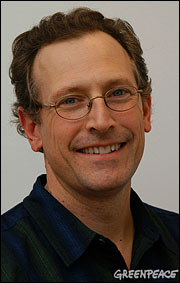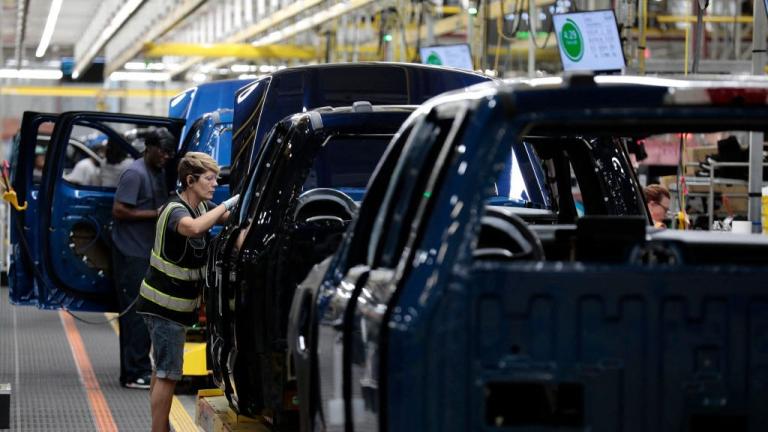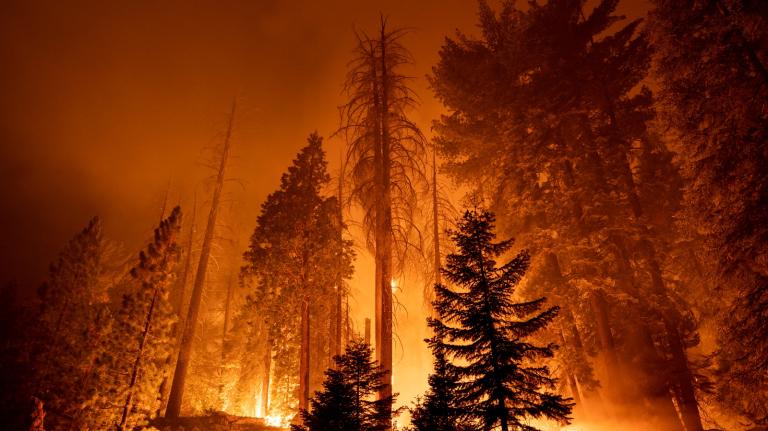
Greenpeace has earned a reputation as the environmental movement’s radical faction, and John Passacantando, executive director of the organization’s U.S. arm, has been right in the midst of the action.
He took the helm of Greenpeace USA in September 2000, after the group had fallen on hard times and into deep disagreement over its direction. Under his guidance, the organization built up a strong grassroots base and grew its budget to $30 million annually. And it continued using theatrical tactics to call attention to environmental degradation at home and abroad — like the recent activist march that Passacantando led on the Japanese Embassy to protest the detainment of anti-whaling activists.
As of Jan. 1, Passacantando is stepping down, planning to start a consultancy to advise institutional investors on environmental risks and opportunities. But he says he’s not done with the movement — and not done getting arrested for the cause.
—–
Grist: Now that you’re leaving and looking back on your time at Greenpeace, what would you say you’ve been most proud of over the past eight years?
Passacantando: When I got here, Greenpeace was really in need of rebuilding. There’s been a lot of work spent on building this into a powerful force on the environmental spectrum — one that takes no corporate money, no government money, that raises most of its money on the street from canvassers. An independent, resilient organization that takes the science position, not the negotiated position, not “What do we think we can get?” “What will it take to get the coal-state Democrats?” “What will it take to get the chemical industry to move?” [We’ve been building a group] that lays down what needs to be done to protect our ecosystem, and that’s part of a global organization. That has been the eight-year job for me.
And this place is really healthy. The budget’s nearly doubled. We were millions in debt, and it’s all gone. The staff is strong, there’s a lot of depth here. So that all led me to know I could leave, it was time. I’ve been here twice as long as any of my predecessors, and I’m the only one leaving happy.
Grist: Your eight years overlapped almost exactly with the Bush administration.
Passacantando: It was a wild eight years, a nerve-racking fight. There were some environmental gains — better protections in the Amazon for the rainforest, protection of some of the fisheries in the Bering Sea, pushing toxic trains out of cities like D.C. But also in those eight years there were mortal threats coming to Greenpeace from the Bush administration. We were audited by the IRS because ExxonMobil paid a front group to say that we were laundering money. It cost us tens of thousands of dollars. We not only survived the audit, we thrived in it.
We did a whole global campaign to stop the clear-cutting in the Amazon, where illegal operations were going in, spotting the mahogany trees from the air, and then ripping in there and getting them, which starts the whole destruction of the forest by cutting initial roads. We began actions all around the world [to stop] shipments of illegally logged mahogany, which we called “blood wood.”
We did that here half a year after 9/11, and the federal prosecutor — with whom I once worked to identify illegal imports of ozone-depleting chemicals — came after us for boarding the ship and putting up a sign that said “Stop cutting the Amazon.” This one-time great prosecutor came after Greenpeace [using] an 1872 law against sailor mongering, [intended] to keep prostitutes from jumping on ships as they come to shore and luring [sailors] to brothels with whiskey and then trying to sell them into servitude, a law not used since the 1890s. He showed the jury a five-foot poster board and said, “I want to give the jury a sense of how big the ship was that Greenpeace climbed on.” On the sign was upright on its end this big, long ship, and next to that, to give it perspective, was one of the Twin Towers and a 747. So it was a 9/11 trial. It would have been the first time a nonprofit organization was convicted for assisting civil disobedience. It never happened in the Civil Rights era, it never happened with the anti-apartheid movement. This was going to be groundbreaking, and it was going to spray cold water on civil disobedience in America. We won that one, it was thrown out by the judge.
Grist: You were arrested as well, right, at least once?
Passacantando: Which time in particular? I’ve been arrested almost a dozen times for civil disobedience. There will be more with whatever I do next, because as a tactic, at the right time and the right place, it’s really a beautiful, empowering tool. It’s one of the important ways to express yourself in a democracy like this.
Grist: So what is next? Under what flag will you be arrested?
Passacantando: Well, I’m going to come back and get arrested under the Greenpeace flag when they ask me to, because I love this organization.
I want to develop some research to provide to institutional investors. Many of these guys have mandates to do green-energy investing, and there’s hundreds of billions of dollars on the sidelines right now. I studied economic history. When these things collapse as economies around the world are doing right now, what comes out of the ashes, if you’re lucky, is the whole next generation of stuff.
What comes out of the ashes is not General Motors. General Motors, whether they get bailed out or not, is probably not going to survive this. We don’t really need the company. We worry about all the people and all the suppliers of upholstery and steering wheels and paints and all that, but we don’t need the company. We don’t really need companies grinding up mountains in West Virginia to get the coal out. It’s not the way we want to create energy in the 21st century. We know we don’t need to rebuild the nuclear industry. It’s the most expensive way imaginable to create energy, whether you call it green or not.
So the institutional investors, or what the public calls Wall Street, they actually need some direction on this, they need better information. That’s the kind of analysis I want to do.
Grist: How did you come to the environmental movement from an economics background?
Passacantando: When I was in college in the early ’80s, there were difficult economic times. Now the severity of this recession is blowing past that one. I was intrigued by economics and then I studied it, and I went to this fellow, Jude Wanniski, who had his shop, Polyconomics, in New Jersey. He was providing research to all these institutional investors. He wrote a book called The Way the World Works. I wouldn’t say that Jude knew the way the world works more than anybody does, but he did have a way of understanding what was happening in the economy that you couldn’t figure out at the time from reading The New York Times or studying it in school.
At the same time, I had grown up with my father taking us camping, canoeing, and hiking in the wilds of New Jersey, and camping in Maine every summer. So I loved the outdoors, but that was just avocational to me. Vocationally, I was doing economics stuff. I was working as an economist, selling the research to Wall Street, and I was in graduate school in economics at NYU, which was all sort of go-go economics, up and through the crash of ’87.
And then a buddy of mine, a guy named Martin Rapp, who ultimately went to work for the New Jersey Department of Environmental Protection, he would about weekly drop a book off at my house, all part of the environmental canon: Rachel Carson, Aldo Leopold, John Burroughs, John Muir, Ed Abbey. So I was having this other thing happening, reading the radical ecological canon, and it was really bending my mind because the go-go economics were destroying what I loved. There was a conflict in my head. And I like to say that the two Berries knocked me out of graduate school: Wendell and Thomas. When I read those guys, I realized that I didn’t want to get a Ph.D. in traditional economics.
Then I got into a local environmental fight with neighbors where we stopped the destruction of an upland wetland, and then I got into a foundation job. What I saw, from working with the Florence and John Schumann Foundation, was that there was this environmental movement that was not piercing through the corporate media veil, but it was alive. When I saw that, I just thought, “I want in.” So that’s how all those pieces came together to make me start Ozone Action, which I ran for eight years.
Grist: A lot of people are now talking about a green economy being the phoenix that rises up from the ashes, and these are people who weren’t talking about green anything a few months ago.
Passacantando: That’s all very promising. Of course it’s being spun in innumerable ways. There will be many sorts of experiments on this. There’s no way that President-elect Obama’s team will just come in and get this all right, because they don’t really know where the bottom is, they don’t even know where all the problems are.
I think it’s going to be a long road, but the hope — and it’s neat to hear so many people talk about it — is that we build up out of these ashes a real sustainable economy. Sustainable meaning it doesn’t destroy the ecology, it doesn’t destroy the systems that give us life in order to make a buck. More people understand that than ever, but it’s still a challenge. ExxonMobil still has a lot of lobbyists. The coal industry still has a lot of sway with coal-country Democrats. The nuclear industry wants their money, and they can’t get it from Wall Street.
Grist: While we’re hearing people talk about green stimulus and green economy and all of that, you still hear people argue that we can’t afford it, that this is not the right time.
Passacantando: For people who say, “We can’t afford to do it,” I would just say, “Based on what math?” Because you could also have said that we couldn’t afford what we’ve done in the last 10 years. We couldn’t afford the population of automobiles on the road to be overly heavy and inefficient. We did it. We couldn’t afford to lose 4,000 people and over 100,000 Iraqis to protect oil supplies to the U.S. to drive those overly heavy and inefficient automobiles. We couldn’t afford to let the banks make really bad loans, and then package them up, disguise them, and sell them off around the world. We couldn’t afford to do any of that, but we did it all, and we’re paying for it now. But we don’t want to do more of that. So now if you use real math, math that’s rooted in ecology, maybe we could do something that we need and that we can afford.
Grist: Greenpeace is seen as pretty far to the left on the spectrum of the green movement.
Passacantando: When I got to Greenpeace eight years ago, we weren’t even a member of the Green Group [a coalition of major environmental groups], so I joined right away. There are a lot of things we had in common, and things that we didn’t have in common at all, but I knew it was important to participate, share, and see where everybody stood, and respect the diversity of approaches.
I never call Greenpeace’s role in this radical or left, because if you look at what we do on global warming, it just says, “What does the mainstream science dictate that we have to do?” It is not our job to think, “How will I get a coal-state senator on board? I can weaken this thing, and get them on board.” That’s the job of the politicians. Our job at Greenpeace is to speak on behalf of the public that funds us that says, “You go fight and save these ecological systems for us.”
Grist: It seems that there’s been a lot of effort in the environmental community in the last few months to put forward a more unified message, one that’s focused on climate and energy and a green economy. Last month, 29 of the green groups, including Greenpeace, put out a big plan for Obama, which seems significant.
Passacantando: I think that’s true. There’s a lot of good leadership at the Green Group, and despite the diversity of opinions, we all know we need to get this stuff right. We know we need to have this green, renewable-energy field supported. We know we need green jobs. We know we need a hard cap on CO2 emissions. When it comes to those basics, we’re all the same, we’re all reading out of the same ecological text.
Grist: Will that unity hold up when we get a new climate bill next year? Last year, with the Lieberman-Warner bill, there were some big differences between the green groups as far as who supported it and who opposed it.
Passacantando: I can’t predict. Certainly, Lieberman-Warner became quite an ugly scrum. I can only say that where you’ll find Greenpeace is pushing for doing the right thing as determined by the science. Nevertheless, it’s always going to be a scrum, and part of politicians’ job is to do all of this horse-trading and deal-making, but we will do our best to hold the line to actually save the planet and not just get a hollow bill.
Grist: Greenpeace has earned a reputation as the people who do direct actions, the people who will get arrested for the cause. Over the next few years, if the role of Greenpeace is not protesting all of the negative things that the government is doing, what will the group’s role be?
Passacantando: As excited as we are about this new administration, we are in a race against time. On behalf of saving the ecological systems that give us our life, Greenpeace’s job to break through the complacence and show in sometimes shocking ways, sometimes funny ways, and sometimes perplexing ways that we’re not doing enough fast enough. We’ve got to win, and we’re going too slowly.
A few hours after we finished our interview, Passacantando sent an email with further thoughts about his time at Greenpeace:
“When I really think about it, what I am most jazzed about after eight years is the thousands of young people we have trained through various programs here. We trained and brought 230 students to the climate meeting in 2000, ran week-long trainings with Seventh Generation for more than 500 people to teach activist skills, have had 250 students do a college term inside Greenpeace to learn how to campaign, and we rebuilt our canvass, which has had thousands of people move through it in the last five years, and not only are they great fundraisers, they are also fierce, unstoppable, and the next generation Rainbow Warriors. I love that energy.
“Activism can be a pretty rough and messy business … But I did get to work with an amazing array of talent that is fighting for our ecological systems and who now work on a whole range of social-change issues, the kind of people who keep a democracy on its axis when the nationalistic winds blow. That is why having this job has been such an honor. That’s what I am proudest of. I think of Martin Luther King Jr.’s quote — ‘The arc of the moral universe is long, but it bends towards justice’ — and I think of all these activists I have worked with as helping to bend that arc.”


